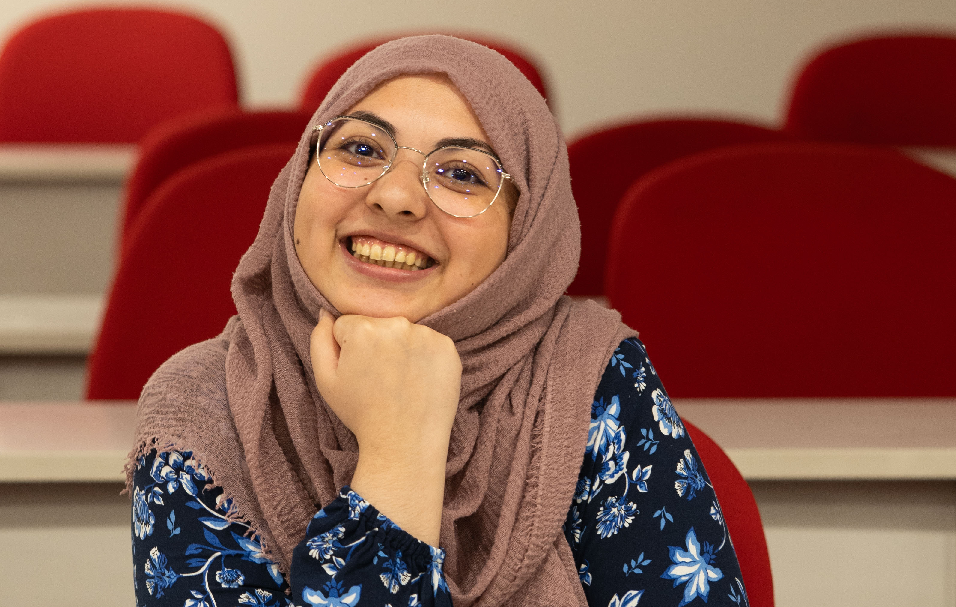
Hameeda Syed [she/they], freelance journalist and co-founder of Dignity in Difference, reports on identity, power, and belonging, with work featured across South Asia and in the cross-border Queer Caravan project. In this inspiring interview, she emphasizes queerness as a language that makes silenced voices heard, stresses joy as a form of justice, and highlights storytelling as a tool of visibility and resistance – an archive of queer presence that insists „narratives can defeat armies“. Hameeda further underlines that belonging is created by showing up, listening, and carrying each other’s stories forward.
Note: Click here for the german version of this article
Dear Hameeda, much of your reporting explores identity through the lenses of gender, culture, and power. How does queerness add another dimension to the stories you choose to tell?
First of all I’d like to express my gratitude to theinder.net to share my thoughts. I believe it is spaces like these that allow for so many stories to exist and be celebrated. Your work is important and visionary and I wish you all the best in your endeavors.
Thank you…
Coming to your question, I like to think of queerness as the language that articulates the silence present in gender and culture. Or rather, the language that is able to respond to the silence that power normalizes in our culture. Who gets to speak, and whose stories get to be valued in all of these aspects? Whose imagination of the future is considered perfect? And how do these perspectives travel across cultures to define who or what is normal and what isn’t? When I started my journey in the Queer Caravan, a platform thoughtfully curated by The Queer Muslim Project, Goethe Institute, and the French Institute of India, much of our discussions were around the silence of our identities, and how this power influenced our choices and our approach in defining our freedom. For all six of us from Germany, France and India, the burning question was: how do we make ourselves known? How do we show what it means to live at these multiple intersections? And how do we embody all of what we go through: joy, desire, Angst, fear, individually and as a community, to spark reflections and strategies to help us imagine what inclusive futures look like?
What began as online conversations at Queer Caravan became a living archive of queer imagination across borders in real life. It became a way of writing ourselves into the present history, of the public eye. To me, the Caravan became a project and a practice of visibility and of dismantling power: an insistence that queerness must be seen, heard, and celebrated in its full complexity.
In your work on Kashmir and South Asia, where social and political belonging is often contested, how do you see queer voices fitting into or being excluded from these narratives of identity?
In the battle for belonging, certain truths are often privileged over others for the sake of the so-called greater good. In that process, minority voices, including queer voices, tend to be excluded. Power usually rests with what is already known and socially accepted, not with what fundamentally unsettles those truths. I see this as a push-and-pull moment: on the one hand, more queer stories are surfacing in the region, challenging what counts as belonging and expanding the conversation. On the other hand, the backlash and repercussions are intensifying. Yet the very existence of this push and pull creates space for more voices and more depth. As a storyteller, I find hope in meeting this moment and amplifying the narrative, because it’s a quiet opportunity to build evidence on the discourse on belonging slowly shifting toward leaving no one behind.
As someone who writes about justice and marginalization, how do you balance telling stories of vulnerability with highlighting resilience and joy within queer communities?
I believe joy is justice. I’ve been a witness to many spaces, where joy was nurtured to build endurance for timeless pain and anguish. One of my friends always quotes this line from an acclaimed Urdu poet, Faiz Ahmad Faiz, „Lambi hay gham ki shaam, magar shaam hi toh hay / The night of sorrow is long, but it is still just a night“.
Wonderful…
I feel our imagination of vulnerability steers often towards showing and articulating pain, but there is much to be vulnerable about when you’re laughing until you can’t breathe, or when you’re so grateful that you can’t help but cry. Or when you’re able to joke about the most difficult moments in your life by making them absurd. I’ve come to realize that not articulating these moments does great injustice to our realities, and risks the assumption that we can’t change our perspectives, especially when it no longer serves our values.
That’s why being part of the Queer Caravan felt like such a natural step, because it was about telling a story that included all the extraordinary moments of queering the boundaries and choices of my life, and making the most of it. Through joy, of course.
Your journalism often intersects personal and political realities. How does your own sense of identity shape the questions you ask and the stories you feel compelled to pursue?
I began to write because I had so many questions about myself. Writing was sort of the patient listener and observer to my struggle in articulating the silence within me. That experience taught me to look for the silence in others. Whose power was shaping what they said? Who was not speaking to me, and why? In the process, I realized my own biases, prejudices and privilege. I learned to shed neutrality, to be honest about my values, and to remove as many obstacles as within my power that can affect my ability to listen and facilitate.
Belonging can mean access, to resources, safety, or recognition. How do you use the Queer Caravan to amplify the struggles and demands of queer individuals seeking that sense of belonging in South Asia?
Belonging is so primal to all of us. So many of us choose our values because of it. Because the nature of Queer Caravan made it possible for us to move around spaces, cities and people, so much of belonging lived in fleeting yet powerful moments: Rachit, Maniza, and Rafiul guiding us through writing a collective imagination; Douce, Kadir, Jamal, Poongodi, Zakaria and I building futures together in rehearsals and on stage; the vibrant spaces of reading, reflection, and discussion made possible by the French Institute of India and Goethe Institute. These were memories that became language for our struggles and demands, and language for joy and resistance. Queer Caravan as a platform taught me that belonging is created in the act of showing up, listening, and carrying each other’s stories forward. It remains, for me, a travelling commons, an ongoing archive of queer presence that insists anybody can belong, and that everybody can imagine a powerful future.
Storytelling can challenge who is allowed to be visible. In your view, what responsibility do journalists have in expanding the space for queer self-representation and fluid identities?
I once learnt this phrase in a classroom on Gender and Power. „Narratives defeat armies“.
Wow…
Whichever fort you choose, the narrative holds power over our actions and choices. Journalists hold power over who is seen as human, who is remembered, who is grieved, and as such, the medium must hold space for contradictions, and to hand the words back-for queer lives to define themselves on their own terms.
The space given to me through the Queer Caravan at theinder.net is already a testament of the platform and its effect across borders. How might this look across newsroom cultures, across narratives intersecting with different ideologies and across many other borders beyond the one you and I just crossed? The inevitability of queer existence, and the courage to make it visible would nurture the seeds of queer storytelling, and eventually, a queer future.
Thank you for these inspiring moments.
Link: Queer Caravan – stories from India, France and Germany






